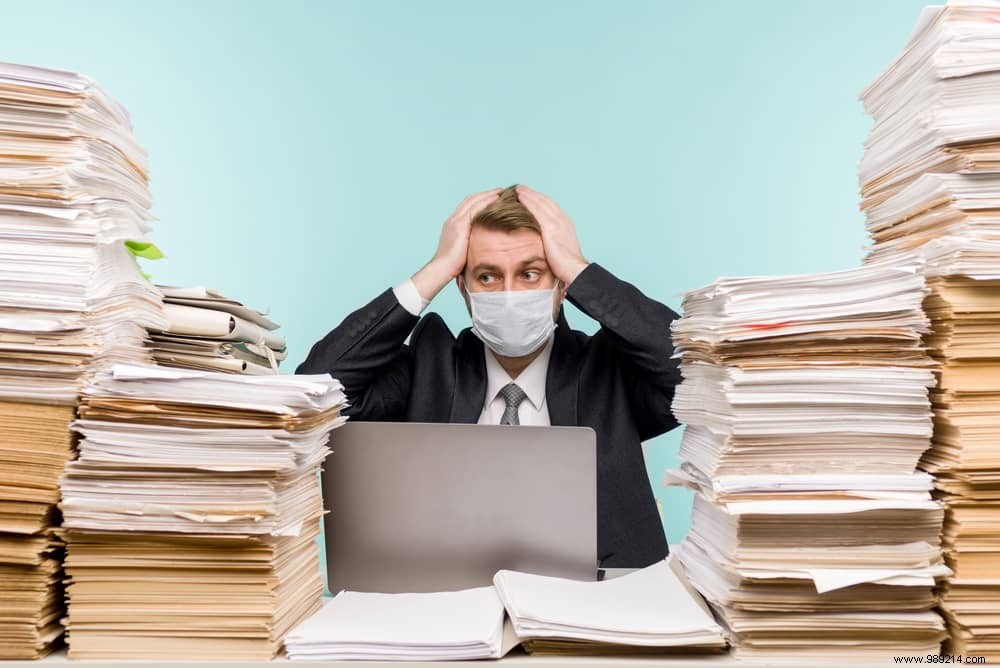
Did I handle this case well before I left? Will the co-worker replacing me be okay? On vacation, there is nothing more nerve-wracking than worrying about what is happening at the office. However, by putting a few tips into practice, you can go on vacation with peace of mind.
Mental load summarizes the fact of thinking of two elements of two different and physically separate spheres. This is referred to as the "double day" concept. For example, planning tasks for family or domestic life while you are at your workstation.
The mental burden primarily concerns women, who are often the ones on whom most of the domestic work and household work in a couple or within a family still rests. This phenomenon would thus affect nearly 8 out of 10 women, according to a 2018 IPSOS study.
If we think more about the mental burden that mixes the private and professional spheres, its purely professional counterpart should not be overlooked. The professional mental load is materialized by a large amount of information to process, the way we process it, as well as the means we have at work to do so.
The mental load is an element that weighs on daily life and affects the people concerned. For example, a study has shown that 95% of executives think about their work in the evening at home. 75% experience sleep problems and 57% relationship tensions due to difficulties at work.
This overflow of thoughts tends to exert psychic pressure, in the sense that it represents an additional weight on top of the responsibilities that one assumes elsewhere.
If left untreated, mental workload can lead to stress, depression and burnout.
People who suffer from mental workload pressure often have symptoms such as:
This pressure can also affect our health. Thus, physically, the mental load can materialize in various symptoms:
Talk to a healthcare professional
Do you feel overwhelmed by your daily life and can no longer manage your emotions? Health professionals such as psychotherapists can help you. Our psychological support assistance listens to our members to advise them and support them in their daily lives.
Difficult for you to separate things between work and personal life? Need help organizing your time better?
Organization is the key to a successful vacation start. It reassures people who tend to stress easily. You can list the tasks to do in order to determine what you can finish in time without overloading yourself. If you are a manager, it allows you to see what and to whom to delegate certain tasks. A summary table and a retroplanning are tools that should help you plan the details of your departure. Knowing that everything is under control is a key to ease your mind.
Some mobile apps can help you get better organized at work. Any.do is an app that allows you to edit notes, lists and reminders, and centralize them on your Smartphone. Are you still working remotely? Need to communicate better with your remote colleagues, to organize your replacement during the holidays? Slack is the perfect app to improve your productivity, available on computer, tablet and Smartphone.
Shedding the mental load also involves knowing how to say no and refusing to do tasks that are not within our attribution. For example, your manager or a colleague assigns you things to do that are not within your purview, or that cannot be done within the time limit? Don't be afraid and say you can't do it, even if you're new to your job. If you accept once, it will be difficult to give up later.
At work, communication between colleagues and with your superiors is also the key to not feeling overwhelmed by the load you are given. Feel like you're working too much? The Toggl app allows you to track your working time and productivity in real time. Convenient for managing your schedule or that of your teams, and not being overwhelmed!
Taking time for yourself is essential to reduce your mental load. This means giving yourself a time slot where you think of nothing but your own pleasure. Recently, some Covid-related restrictions have been lifted. You can therefore allow yourself between 12 and 2 p.m. a sports session in the gym, a meal on the terrace from time to time, or even a walk. Treating yourself to a good meal on the terrace, all without looking at your phone, is very effective in letting go. Give yourself moments of digital detox, thanks to an application like Offtime, which helps manage your digital disconnection.
At work and at home, establishing a dialogue and distributing the load of tasks fairly thanks to a clear organization can help you go on vacation more peacefully. If you feel overwhelmed, do not hesitate to say so and ask for help from your work colleagues, your superiors or even a health professional.
https://www.doctissimo.fr/psychologie/psychologie-feminine/charge-mentale
https://www.myfamiliz.com/charge-mentale/
https://www.souffrance-et-travail.com/magazine/dossiers/stress-travail-et-sante/charge-mentale-comment-le-travail-empoisonne-notre-vie-privee/